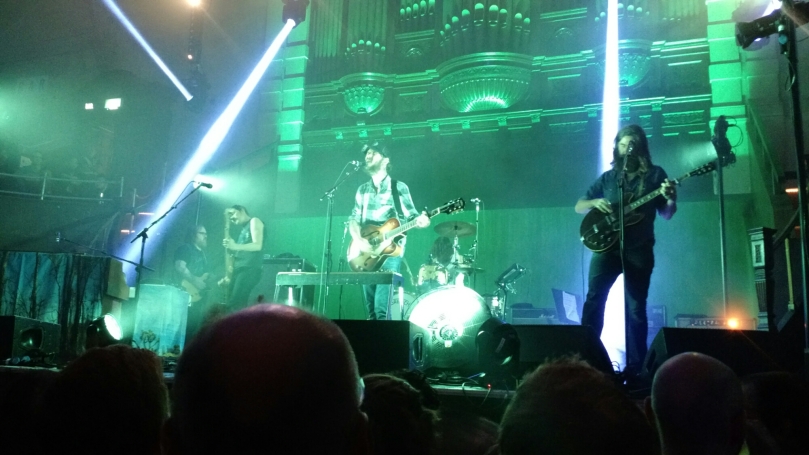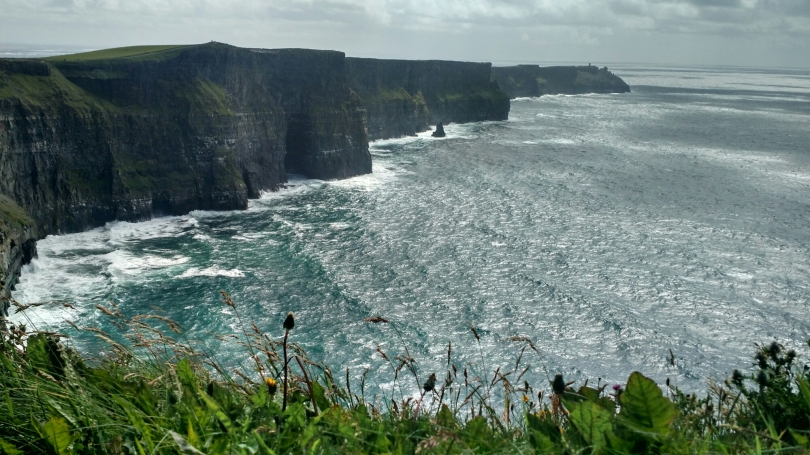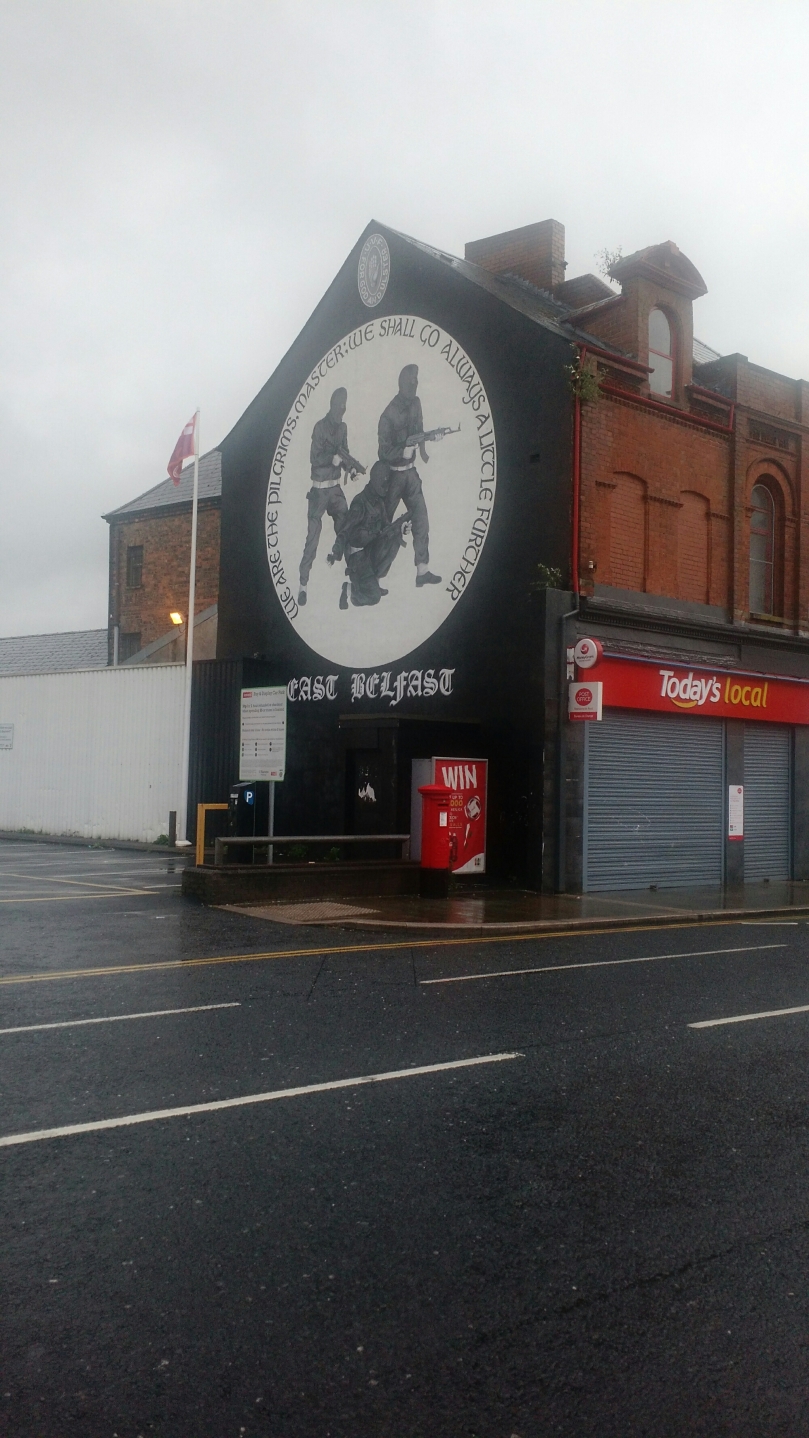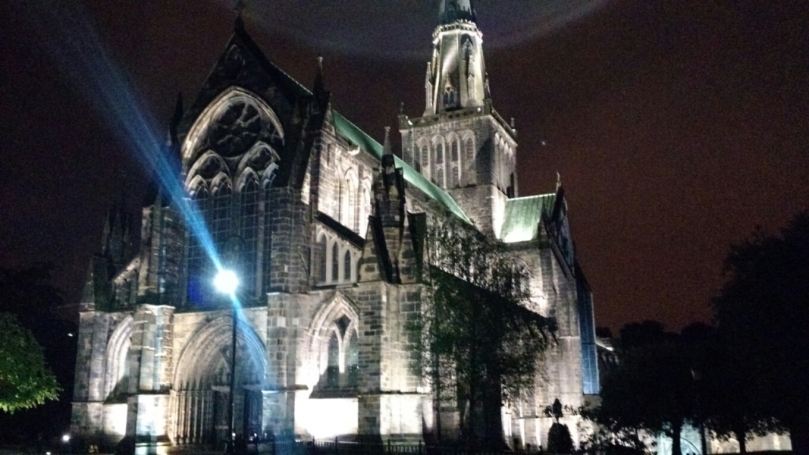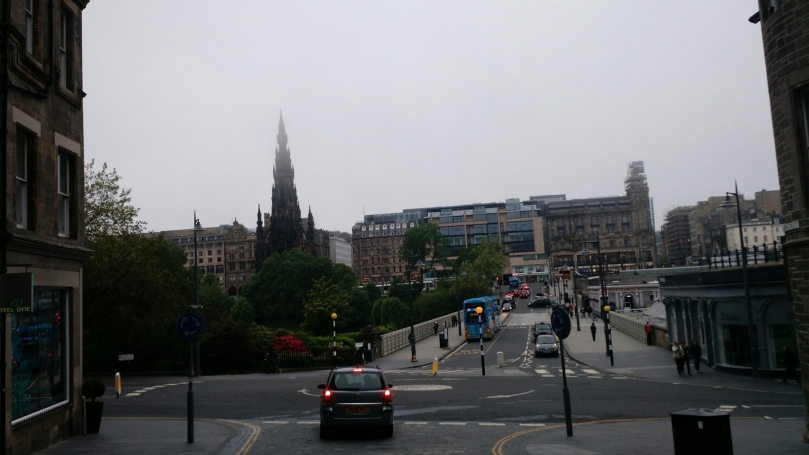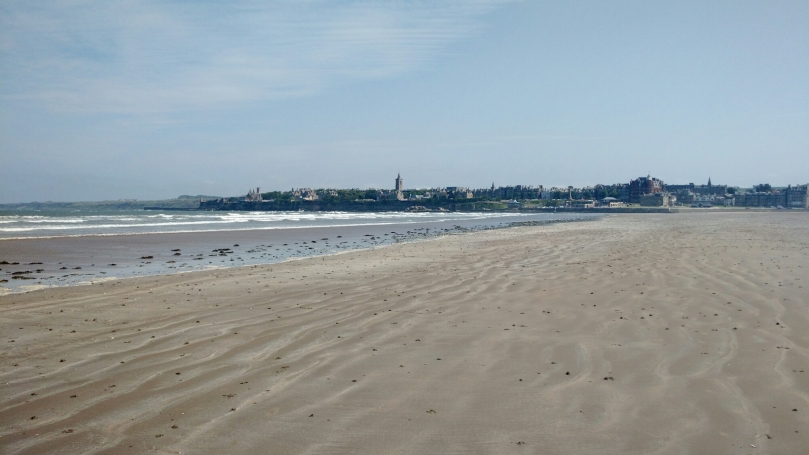Google Maps says it takes three and a half hours to get from Dingle to Galway by car, going east up the spine of the Dingle Peninsula to the mainland, bending northward at Limerick for the second half of the journey. But even on a great day of hitchhiking, between waiting for cars, walking to new hitching spots, changing spots, and the usual eating and exploring, three and a half hours can turn into six or seven. And that’s if things go well. So I got to an early start.
Dingle is a very small town, so it was just a couple blocks from my hostel to Hitchwiki’s favorite spot on the road east, a little stretch of open pavement just beyond the gas station at the edge of town. There wasn’t a lot of room to pull over, but a car quickly did, and moments later Dingle was disappearing around the bend behind me.
Jack lives in Dingle with his wife and two young kids. A mixed Irish-Canadian couple, they lived in Vancouver for years but always with the intent of moving to Ireland, and Dingle in particular. Jack works in hospitality. I don’t remember exactly what he does, but I remembered the important thing – shortly before I was there, Star Wars Episode VIII was being filmed further out on the Dingle Peninsula, and Jack’s hotel housed all the construction crew for the sets. I guess in order to do more extensive filming of Luke Skywalker’s little hermitage in The Force Awakens, they recreated the area in a less historically significant locale with comparable scenery. Jack said they’d only just finished set breakdown the week before I arrived, although he wished they’d have left it up. I am living evidence that it would be a great tourist attraction.
They were driving to Tralee to buy a bike for the mom’s birthday. It was a surprise. We talked about Vancouver and Canada, comparing road trip stories and discussing the differences between setting such a trip in Canada vs America. When my travel blog came up, Jack caught the attention of his daughter in the backseat. Turns out she runs a little blog herself. She’s the youngest blogger I’ve met, and maybe the most enthusiastic. We swapped blog info, and as of this post, we’ve both covered the event in our own writings.
From the highway bypass around Tralee, I got a very quick lift with some utterly unintelligible dudes to Castleisland, then looked for a ride north, which I got fairly quickly in Billy, from Dublin, who was going up with his two little kids to Bunratty to see their grandmother. Bunratty is a little castle-tourism town just past Limerick. He’s a schoolteacher, so we talked about that, as well as my plans for the next couple weeks. He’s a big fan of Liverpool, both as a sports entity and as a place – turns out there’s a big Catholic connection between the Irish and Liverpool. Sports allegiances are complicated over here.
I had a gas station croissant in Bunratty, took a little peek at the castle, and checked the time to see that it was only about noon, and I was only about 80 minutes from Galway. I was absolutely flying. I decided to add an hour to the predicted drive time and go west to see the Cliffs of Moher on my way up. The weather couldn’t make up its mind between pounding rain and warm, clear sunlight, so I had to duck for cover every few minutes, but I got a short lift to Ennis and another one to a more useful route out of Ennis, and then a third lift with Justin and Naoimi, a college-age couple en route to a weekend holiday in Lahinch, the last major town before the cliffs. When the sun came back out they put on the Beach Boys and we talked about fish and chips and Trump. From Lahinch, I took one more lift from an old, heavily bearded, Santa-type guy, and then I was at the Cliffs of Moher Visitors Center.

The Cliffs of Moher are a five-mile stretch of epic cliffs over the Atlantic Ocean, with heights ranging from 390 to 700 feet. Those numbers don’t do much for me either. You should probably just go see them. (You already have if you’ve seen The Princess Bride.) Once you leave the little area by the visitors center, you can walk right on the edge if you want. But I wouldn’t recommend it on a day like mine, where sudden gusts of wind were knocking people all around, the kind of wind you can lean comfortably into without falling. The wind only added to the surreal aura of the place. The central part was crowded with tourists, but there was none of the jadedness or entitlement or contagious stress that can give tourists a bad name. The people milling around and taking pictures atop the Cliffs of Moher that day were all awestruck, stopping every few steps to just marvel and take it all in, sometimes giggling to themselves at the absurdity of it all. People were talking, laughing, shouting, but no one was gabbing about how late they were or how underwhelming lunch was or anything dumb like that. People were happy up there.


I could see the rain coming in from miles away, but it was so fun to watch that I didn’t head back down until it was almost upon me. The temperature dropped hard, and when the rain wasn’t falling in cold, slapping drops, it blew down in icy needles that stung the skin. I tried to get a lift unsuccessfully until my hands were too cold, then warmed up in the shelter of some boxy storage thing in the parking lot – this was the kind of rain you got shelter from by standing beside cover, not under it. When the rain eased I walked onto the road again and finally found a ride in a tiny white rental car driven by an elderly German couple who adorably warned me that they’d be stopping regularly to take photos and asked if I was okay with that. Their English was pretty basic, and I had to keep slowing my speech down, but I gleaned that they’re from around Cologne and have a married daughter in a small town in east Michigan whom they visit every year.
We drove through beautiful countryside, stopping to take pictures of the farms and mountains and ocean as we saw fit. On the way down one hill they pointed at the switchbacks in the road and laughed about how it was like a tiny version of the Alps. Whenever we stopped, we had to take care not to open all the doors at once or the wind would blow their maps right out of the car.


They cheerfully deposited me in Kinvarra, where they were spending the night, which was not far from Galway at all. It was getting close to dinnertime, so I was ready to be there. On the edge of town I got another quick lift, this time from Celia, a friendly local mom who was headed up to Kilcolgan to meet a friend. I pointed out to her that she was my ninth lift that day, tying my record from last year. One more and I’d hit ten! At some point in that chat I must have passed a trust test, because she offered to take me all the way to Galway if I was okay with waiting a few minutes for her friend to arrive – they were going to a mutual friend’s funeral there. They didn’t seem too broken up about it. I decided to forego the record-setting and accept the offer. Before 7:00 I had arrived in Galway.
Everywhere I’ve gone, people have told me to visit Galway. It’s not a huge city, but the city center is abuzz at all hours with visitors and performers and good food and music. There’s an intangible energy about the place that makes it exciting just to be there. What differentiates it from Dublin is that, although it’s certainly a tourist destination, it’s the one that Irish people visit for vacations, not just international visitors, so it feels a little more real, more concretely Irish. I made some chat with a busker playing Radiohead songs, and I joined him for a couple trad songs before grabbing some dinner and checking into a hostel, where I quickly befriended a couple of 30-something Americans from Arizona who looked and acted like a couple but apparently weren’t. Then I went out to busk.
I was lucky to find a busking spot among all the competition. Usually lots of buskers means not a lot of tips, but tonight this was not the case. I followed my usual MO of playing obscure songs that I like, and the outcome was just what I always hope it will be – making buddies through unexpected music-taste connections. One tipper early on thanked me for playing Sufjan Stevens, and later an American girl on her honeymoon tipped me extra to keep playing M. Ward songs (she’d just seen him in the States a week ago), and I talked to another American couple who knew the difference between bluegrass and old-time music and were big fans of both. Additionally, I made some serious money by having a nice non-Wonderwall Oasis tune on hand for requests. People really like Oasis over here.
At 2:00 I was counting money in the hostel common room and getting ready to go to bed when people started pouring in from the closing bars and clubs – a South African-via-Australia, a group of Irish women who wanted to hear some banjo, the Arizonan from earlier, a gaggle of drunken 20-year-olds. Someday I will learn to say no when people want to hear banjo, but on that night I did not learn that lesson. I did not get a whole lot of sleep.
The next day I fumbled my way into a Saturday farmers market and busked some more, the highlight of which was a woman giving me a perplexed look as I played Neutral Milk Hotel, eventually coming over and asking me what the name of the song was. When I told her, something clicked and she thanked me profusely, saying she hadn’t heard that band in ten years and was so happy to have rediscovered them. I done a good thing. I spent my money on delicious farmers market sushi and falafel. It was a really cool farmers market.
My first hostel was booked for the night, so I had to switch to another one, where I met Laina and Avery, two young Americans traveling low-budget across Europe in their own way. Avery told me my last name when I told her my first; they’d been around when I was checking in downstairs. I somehow decided I would join them for the first half of the hostel’s official pub crawl before going off to busk later, and I did just that, meeting a couple more Americans from Philly and some goofy Irish dudes along the way. In a good hostel everyone’s pretty social, excited to meet people from other places and times, and on this night it felt like all of Galway operated that way. I think that’s part of the thrill I felt in that town.
When I woke up on Sunday morning I decided that I didn’t really feel like traveling north in the rain, especially since Galway’s allure hadn’t worn off yet. But I was feeling pretty spent, so I didn’t want to do much. Laina and Avery were down to hang out later, going on a bus tour of the surrounding area in the meantime. I did some writing in the hostel and took my time getting put together, and somehow I bumbled into Jordan, a girl from Vancouver Island, Canada, who quickly introduced me to Ben, from Prince Edward Island, Canada, even wearing a Canada shirt. They were each traveling solo and had just met, and I invited them to go wandering with me to the aquatic-sea-something festival that was going on at the docks, where I wanted to buy some seafood and put it in my mouth.
They were a really fun bunch to talk to, and I’ll enjoy keeping in touch with them. Jordan’s incorrigibly flirty, and also married to a dude in Manchester – their relationship works in such a way that she travels a lot and he stays home, and they seem pretty happy with the arrangement. If you’re around Jordan enough you’ll notice that among her tattoos is an area on the back of her hand where the skin is raised in the shape of a pentagram. She had an insert inserted so it would do that. But if her bold attitude and aggressive look don’t put you off, you’ll find that she’s a warm, funny person who’s very loyal to the people she trusts.
Jordan’s been traveling for a long time, and so has Ben. Ben’s a quiet guy with a burly beard who plays the Irish bagpipes. I love meeting a fellow busker and talking shop, and he was a pleasure to do that with as we roamed the sunny Galway streets. He’s played in a handful of cities around the world, and although the strategy for bagpipes is a little different from banjo/voice busking, his general experience and lifestyle are pretty similar to mine. He’s worked out a system where he travels to places where he knows he’ll do well busking, then brings that money back home with him to offset his expenses in leaner times.
I feel like I should mention that by this point I’d made almost 200 Euro in Galway, a pretty crazy amount. It was the first place since Reykjavik where I’d really devoted myself to nightlife busking, and it really paid off. I’m not sure how much of that was Galway and how much was just Europe treating its buskers well, but it felt really nice to have a surplus of travel funds for a while. I’ve still got a big pile of Euros in my backpack for when I’m back in a country that uses them.
Later that night Ben would Facebook message me, saying that without my extroverted presence to tie everything together, he and Jordan kept having awkward lapses in their conversation, and they missed me. That was equally touching and hilarious, but by that point I had reunited with Avery and Laina, and we were patrolling around for some affordable food that wasn’t also boring. I was rolling in Euros, and after seeing how much plain bread and almond butter they were eating, I felt like treating them to something.
Laina and Avery are from Whidbey Island, which Hope College people may recognize as the homeland of campus chaplain Trygve Johnson, and the namesake of his goofy Gordon Setter. The two are definitely Northwest people. Avery’s got a degree in something like wildlife ecology, and between her former-dancer habits and Laina being a Yoga instructor, the two of them were constantly stretching and contorting themselves to ease their travel soreness. They fit the Washington mold in that they don’t eat meat and they exude a scrappy Earth-mother vibe, but they give that mold a good name by being warm, adventurous people, friendly to strangers, curious and spontaneous.
We eventually ended up in an American-themed late-night bar with a tasteful acoustic ’80s cover band (who didn’t play Avery’s Neutral Milk Hotel request) and the young American dudes from Philly from the night before. The night had been fun; having met them all already, it felt almost like a normal night out with friends, something very familiar and settling. But there was something a little grim about being in an American-themed bar surrounded in Americans too – maybe that’s why Avery tipsily befriended the super-drunk older Irishman who had been doing the worm on (humping) the floor earlier, to everyone’s amusement. You can see here how Laina and Avery make great travel buddies. Laina’s a little more reserved (without being lame), keeping them on track just enough, while Avery’s the super-outgoing one (also major flirt) who gets them into situations that up the trip’s ante a little bit. They balance each other nicely.
Laina wasn’t as enthused as Avery, but there we went – from the American bar, the three of us ended up in the company of these two old Irish dudes in a 24-hour fast-food place, eating fries and listening to them joke about whether one of them was a murderous inmate under the other’s watch or not. They were delightful dudes, full of laughter and drunken advice and more laughter. They’re the kind of dudes young women traveling abroad probably shouldn’t get too cozy with, but this time the (possibly) calculated risk paid off. They were good people.
Maybe I just got lucky. I can imagine someone going to Galway and just seeing an unflattering mix of frat party and tourist trap, but it didn’t feel that way to me. Everyone I met there was happy to meet me and happy to be there, and that’s how I’ll remember it. If it’s really like that all the time, than Galway really is a special place. I’ll miss it.

